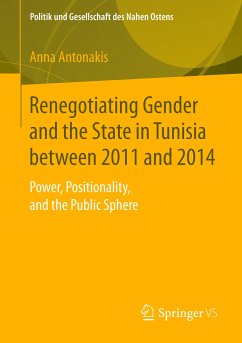
Double-Edged Politics on Women's Rights in the MENA Region

PAYBACK Punkte
38 °P sammeln!
While the Arab Uprisings presented new opportunities for the empowerment of women, the sidelining of women remains a constant risk in the post-revolutionist MENA countries. Changes in the position of women are crucial to the reconfiguration of state-society relations and to the discussions between Islamist and secular trends. Theoretically framed and based on new empirical data, this edited volume explores women's activism and political representation as well as discursive changes, with a particular focus on secular and Islamic feminism, and changes in popular opinions on women's position in s...
While the Arab Uprisings presented new opportunities for the empowerment of women, the sidelining of women remains a constant risk in the post-revolutionist MENA countries. Changes in the position of women are crucial to the reconfiguration of state-society relations and to the discussions between Islamist and secular trends. Theoretically framed and based on new empirical data, this edited volume explores women's activism and political representation as well as discursive changes, with a particular focus on secular and Islamic feminism, and changes in popular opinions on women's position in society. While the contributors express optimistic as well as more pessimistic views for the future, they agree that this is a period of uncertainty for women in the region, and that support by ruling elites towards women's rights remains ambiguous and double-edged.












